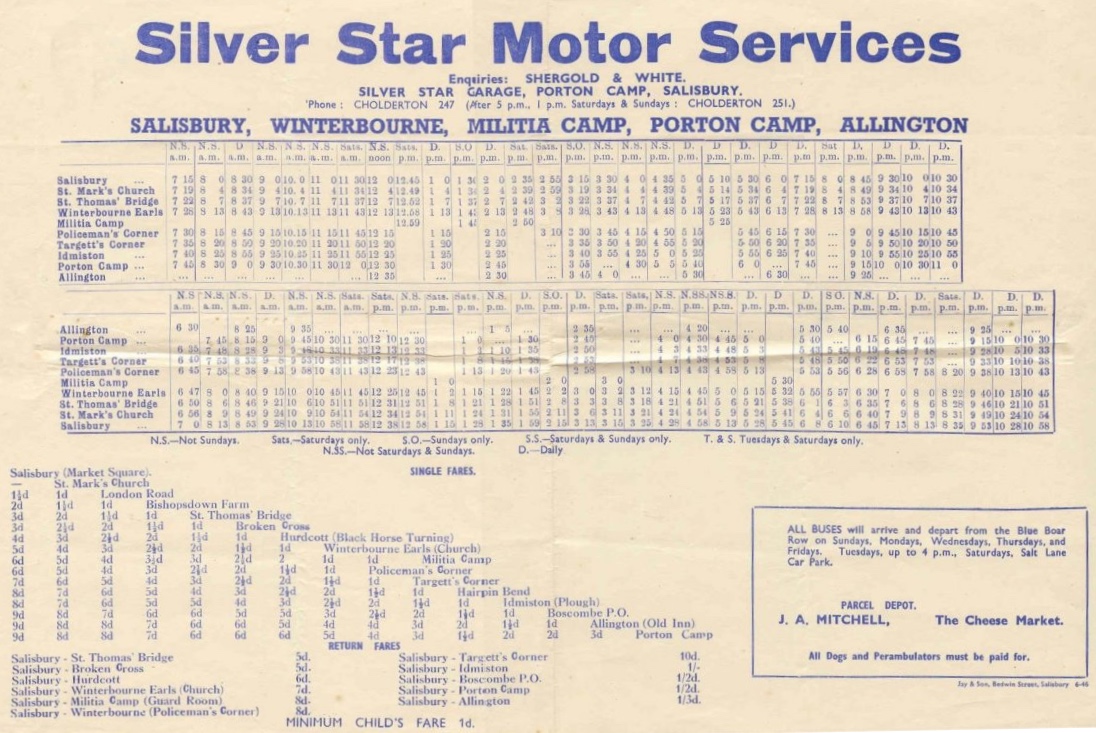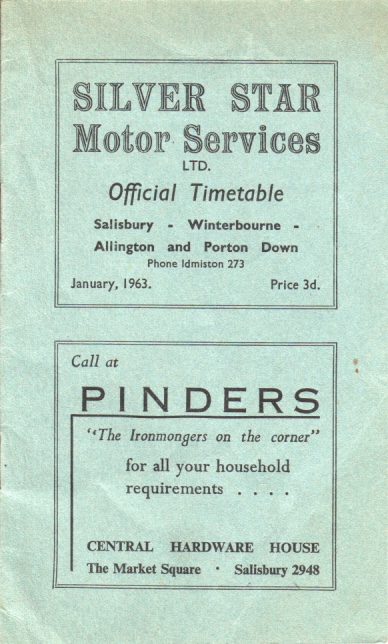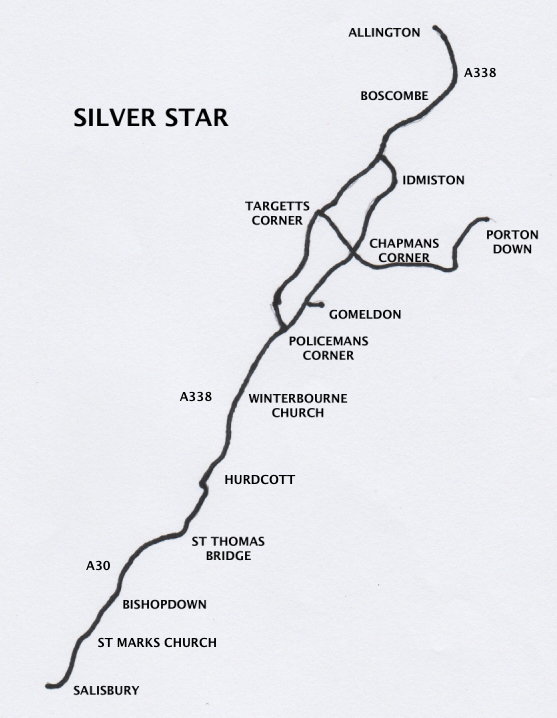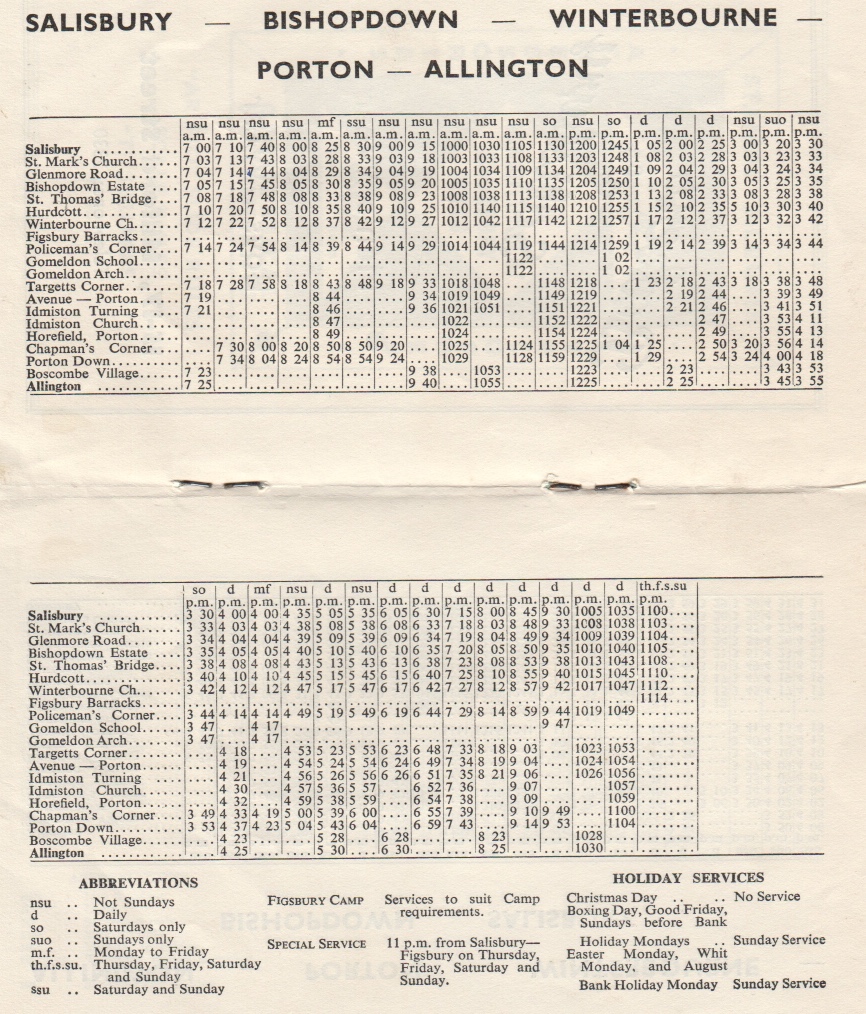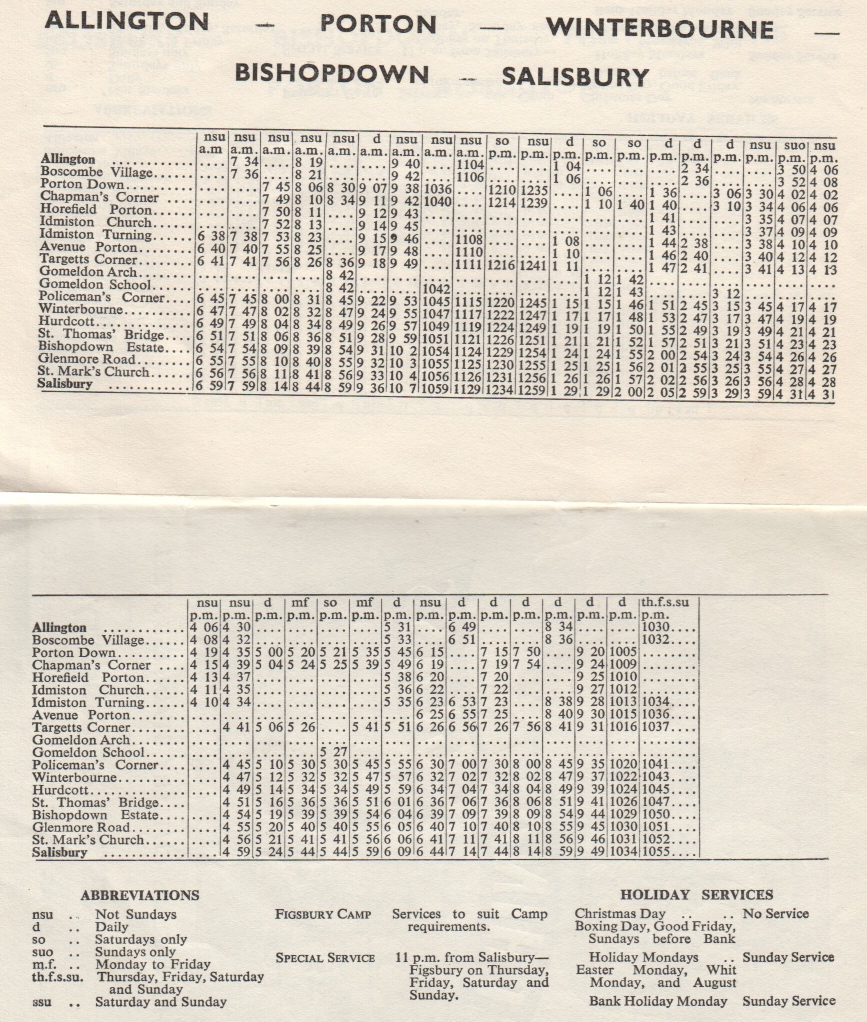| SILVER STAR | 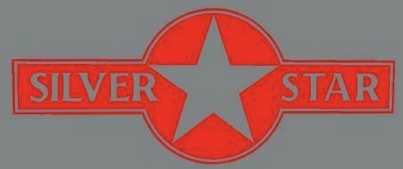 |
|
| Named after a waltz popular long ago, their buses ran from | ||
| Salisbury
to
Winterbourne. Porton and Allington 1923 - 1963 |
||
| SILVER STAR 100th ANNIVERSARY 1923 - 2023 |
||
Please
note - this is a site of historical record and does not contain current
service information
|
||
|
The name Silver Star is often attributed to a popular waltz tune of the 1920s when two young men, Eddie Shergold and Ben White, started a bus service running along the valley of the River Bourne north east from the cathedral city of Salisbury in Wiltshire in the autumn of 1923. Shergold's father William had a horse drawn carrier business from Winterbourne Dauntsey, acquired earlier from J K Rowden. The two partner's first vehicle acquisition was a new Ford Model T (registered HR9447) with locally built 14 seat body by Pitt of Fordingbridge. Originally running on Tuesday, Thursday and Saturday, by 1927 there was daily operation including three return journeys on weekdays between Salisbury, the Winterbournes, Allington and Porton Camp. In the city direction these catered for the needs of schoolchildren and in the other for workpeople to the military establishment at Porton. The road from Salisbury along the Bourne valley was not exclusive to "the Star" as Wilts & Dorset covered the route on their Salisbury-Tidworth service, and there were other carrier operations as well, including Lee of Winterbourne Gunner, Armstead of Newton Toney and Razey of Cholderton. Several other routes into Salisbury were the scene of ongoing competition between the Wilts & Dorset company and independent operators, as also with Skylark from Woodfalls and Downton to the south, and Viney from Chilmark in the west.. Based in a garage constructed adjacent to
the miltary establishment at Porton Camp the fleet had grown to five
vehicles by 1927. The silver in the fleet name was reflected in
the polished aluminium bodies of some of the fleet. The fleet was
already being embellished with headboards carrying the famous Silver
Star emblem, with many of the vehicles also having silver stars painted
on the wheels. As with so many firms that started as partnerships, one
was a traffic man (Shergold) and one an engineer (White). |
||
| New
in 1929, this is Leyland TS
MW4774, a 32-seater, at Salisbury Guildhall - with painted stars on
wheels and logos for both Shergold & White (centre) and Silver Star (twice) |
||
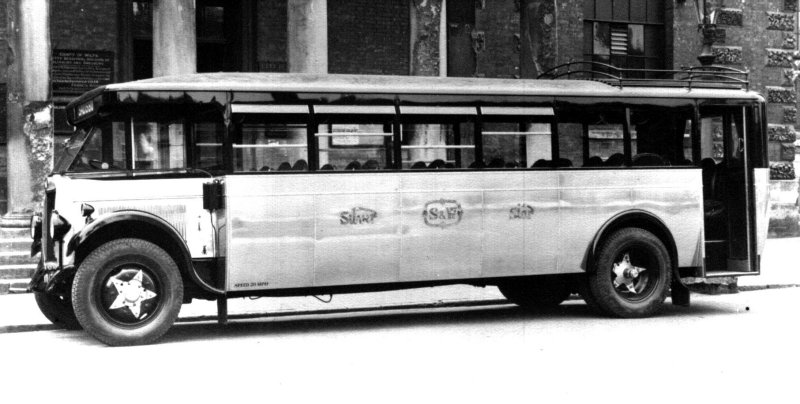 |
||
|
With the impending 1930 Road Traffic Act, Silver Star applied for a number of daily stage carriage services but only the routes from Allington and/or Porton to Salisbury and Salisbury to Sling (near Bulford Camp) were granted to them. There had been hopes that the Sling service would form the basis for a Salisbury - Bulford - Sling - Tidworth - Andover service, and one vehicle had already been so lettered for the route in anticipation, which operated briefly in 1930/31. But it was not to be as the necessary road service licence was refused by the Traffic Commissioner. An excursion licence from Porton Camp was approved at this time. In August 1937, Silver Star sold the licence for the Salisbury to Sling service to Wilts and Dorset, who had been running along the same route since 1914, as part of their Salisbury - Andover services. A timetable from October 1930 shows seven departures from Salisbury for Porton Camp each day from Monday to Friday, thirteen on Saturday and five on Sunday. To Allington from Salisbury it was three Monday to Saturday runs and one on Sunday, plus an extra short to Winterbourne on Saturday evening. On this the Star's main route from Salisbury through the Bourne Valley there was a substantial increase in traffic because of the construction of Figsbury Barracks at Winterbourne Dauntsey. Six 1930-vintage Leyland TD1's double deckers were purchased from Yorkshire Woollen District, the fleet numbers being 169-174. Their registrations were HD4153-4158, and they became Silver Star fleet numbers 16, 20, 15, 18, 17 and 14 respectively. A limited company Shergold & White Ltd was formed to run the business in September 1939. With the outbreak of war in 1939, several of the
fleet were requisitioned by the War Department and these Titan TD1's
had to cope with the heavy wartime traffic on the route. By the
end of the war they were not in best shape and the first new double
decker arrived in 1947. It was a Leyland Titan PD1 with Leyland
53-seat lowbridge body (fleet number 22, EAM 776), and a new single
decker Leyland PS1/1 with Duple
bodywork arrived later in the same year. Two of the pre-war
Titans were rebodied in 1949 whilst the others were withdrawn between
1949 and 1952. Three slightly younger Titan replacements came
into the fleet at this time, two from Birmingham and one from Bolton.
In Salisbury the ironmongers business of Mitchell's in Cheese Market
acted as parcels agents for many years. |
|||
| In 1948 the
Wilts and Dorset
company applied to the authorities for a service to run over the Star's
route from Salisbury to Porton Camp. This was the route on which
Silver Star carried their greatest numbers of passengers but the
W&D application was withdrawn. One year later in 1949 the
East
Gomeldon to Salisbury service of Lee of Winterbourne Gunner was taken
over by Silver Star; this was primarily a Tuesday and Saturday market
type operation, although there were a small number of daily
journeys. Originally Spier and Lee, they had started on the route
by 1920; in later years it was run by Mrs Martha Lee after her
husband Thomas died in 1935. East Gomeldon village is somewhat
isolated, in a
cul-de-sac location approached through a restrictive low roof road
tunnel under the railway
line. With a height limit of 11 feet 3 inches this meant that only single deck vehicles could be used for this
section of road. A short lived experimental diversion of the
Gomeldon route through the village of Ford was tried by 'the Star'. |
a 6d single ticket from Lee of Winterbourne Gunner, whose route to Salisbury from Gomeldon was taken over by Silver Star in 1949 | 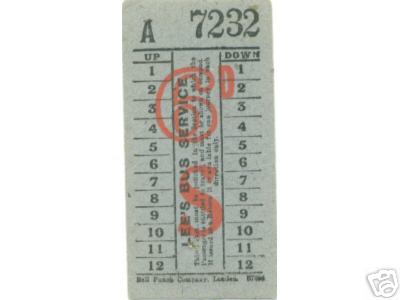 |
|
|
The early part of the 1950s saw a rise in demand for express coach services for the many military personnel stationed in the area in the Salisbury Plain camps, and by 1952 Silver Star had been granted express service licences to run to London from Bulford Camp, Winterbourne Camp and Porton Down. A year later more licences for services from Bulford Camp to Birmingham, Manchester and Liverpool were granted. But Silver Star were not the only operators in the area interested in this traffic and the competition for new express services was to become something of a battle, not only in the licencing courts but also on the ground in booking passengers. These were mainly weekend leave services, going out on Friday or Saturday and coming back on Sunday or Monday. Some routes were shared, some not. By 1955 the Star had gained more licences for routes to Newcastle, Glasgow, Edinburgh and Swansea. Whilst laying over at the distant destination point, whenever possible the coaches were hired out to other operators to maximise income. The Star were proud of their vehicles and their services and the fleet included some of the finest coaches of the time. They were equipped with heaters and radios, which were not then common features. The first underfloor-engined vehicle was obtained in 1952, a Leyland Royal Tiger with Leyland 41-seat coachwork (fleet number 13, HWV793). This was followed in spring 1953 by a similar vehicle (fleet number 14, JMR736). The proprietors lived along the line of their route, Shergold in Winterbourne Gunner and White in Allington. |
|||
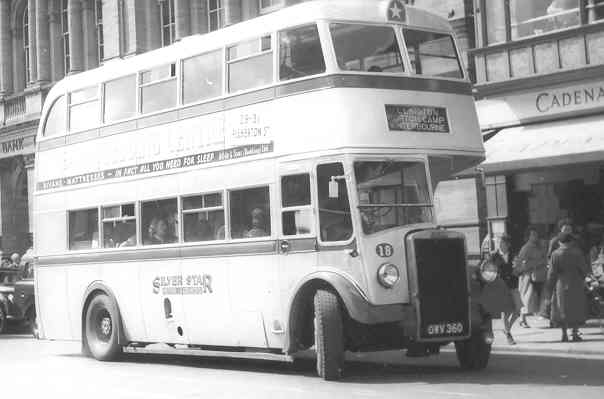 |
GWV360
(fleet number 18) in Salisbury Market Square, Blue Boar
Row. A Leyland PD2 56-seater acquired in 1951. Despite
the name the stars on the buses are now white on a dark background. And
who remembers the Cadena Cafes of Salisbury, Southampton and
Bournemouth?
The Cadena chain was acquired by Tesco in 1965. |
|
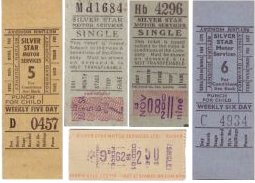 |
||
|
The limited company was renamed as Silver Star Motor Services Ltd in November 1957. Locally a licence application for a workers express service to run directly between Salisbury's then newly built Bemerton Heath and Pauls Dene housing estates and Porton Camp was made in 1957. Despite both Wilts and Dorset and British Railways objecting, on the basis that they would lose traffic, this new service was granted. The Silver Star express service from Bemerton Heath to Porton was normally the province of the PD1 EAM776 (number 22). This was replaced by the newest vehicle Atlantean 1013MW (number 42) during 1962. Otherwise the stage services continued with little change from year to year, although by August 1957 it had became necessary to introduce some one-man operated peak journeys on the bus service. A new Tiger Cub (number 31, PHR829) came into the fleet. Further one-man operation followed in February 1958 with the addition of two further Cubs, (32 / 33, PMW386 and RAM620). At this time the ticket system was changed from Insert Setright (green for singles, red for returns) to Setright Speed for one-man operated services. Also in November 1957 the Company's name was officially changed from the long standing Shergold and White Ltd to Silver Star Motor Services Ltd. 1959 saw the purchase of an ex-London Transport RTL double decker, built in 1949, fleet number 36, KGU263). Also later that year an attempt was made to introduce a co-ordinated timetable between Silver Star and Wilts and Dorset along the Bourne Valley, but with Silver Star remaining the principal operator on the route with a basic half hourly frequency. |
||
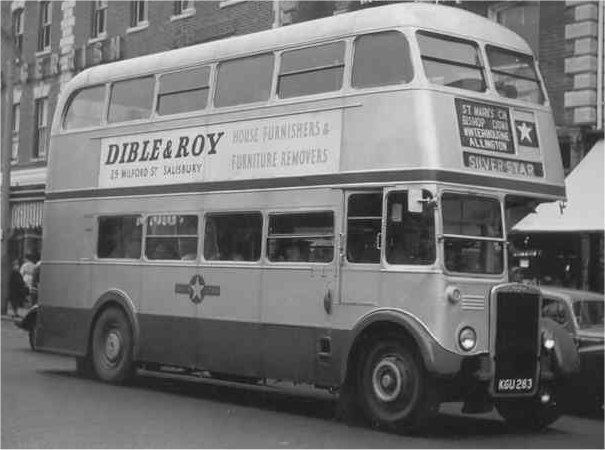 |
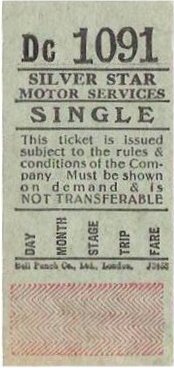 |
|
| RTL KGU263 leaves Salisbury Market Square on the run out to Allington | ||
|
In 1959 Silver Star Motor Services became the first independent operator to put a production model of the new Leyland Atlantean into service (number 35, TMW853). One year after in 1960 the Star introduced a standard fleetname emblem, at the time of the arrival of their second Atlantean (number 37, VAM944). Before this acquisition, the fleetname had been applied in a variety of different styles, but now it was based on a circle and bar reminiscent of the London Transport logo, having the fleetname on either side of the silver star. At this time permission was applied for to operate the Leyland Atlanteans on the military express services, but permission was refused by the Traffic Commissioners. Despite this another attempt was made in 1961 to use the Atlanteans on the express services. Again this was unsuccessful. This was a major blow to the Star, as three more Atlanteans had already been ordered. One was cancelled and one was delivered in July as XMW706, fleet number 40, a 61-seater coach. The other was completed as a 73-seater bus (fleet number 42, 1013MW). On busy days one of the four Atlanteans might make an appearance to help out on the stage service. At summer weekends they might venture to Bournemouth or Sandbanks on excursions. They had been ordered with the express services in mind, but by the time they were ordered the demand for the forces leave services was in decline, all the more so after the abolition of national service a few years later. |
||
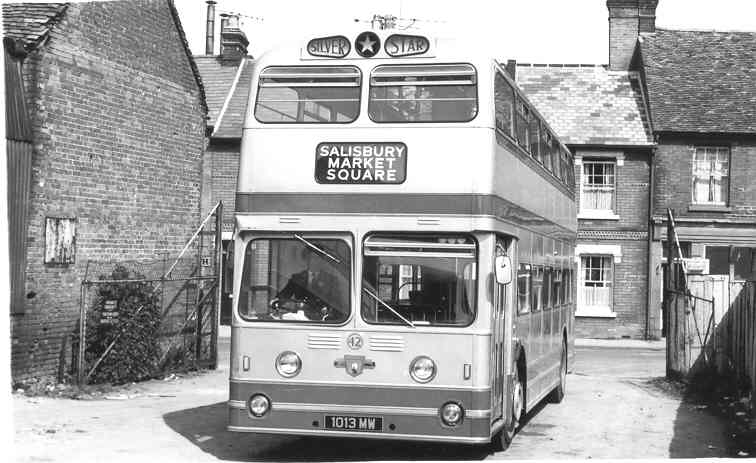 |
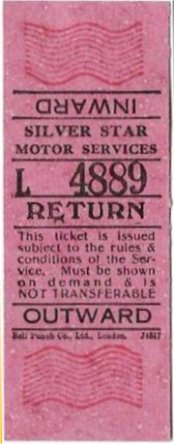 |
|
| One of the Atlanteans, 1013 MW, fleet number 42, entering the yard in Pennyfarthing Street, Salisbury, where a couple of Silver Star's buses used to sleep overnight. | ||
|
In October 1962, Eddie Shergold died aged 64 and this was soon seen to be the beginning of the end for the Star, as in May 1963, the surviving founding partner Ben White, indicated his intention to retire and enjoy his pension. So it was arranged that the company should cease operation on the evening of Tuesday 4th June 1963, and at 10.35 pm in Salisbury Market Square the last run by Silver Star set off along the Bourne Valley, operated by fleet number 32, PMW386, a 1958 Leyland PSUC1/2 41-seater dual purpose bus/coach (see picture below). Driven by Stanley Coleman, it arrived at the depot at Porton Down thirty minutes later, bringing operations to a close. A purchase price of £65,000 was paid by Wilts & Dorset for the Silver Star business and the then fleet of twenty three vehicles comprising the four Atlantean double deckers, two other double deckers (GWV360 and KGU263), thirteen coaches, three dual purpose saloons (the Tiger Cubs) and a minibus; all were Leylands except for one Commer coach and the Trojan minibus. Wilts and Dorset assumed operation of the bus and express coach routes, which were co-ordinated with their existing bus services along the Bourne Valley. Many of the Silver Star vehicles were dispersed to a variety of other operators whilst several of the Silver Star one man operated buses were retained on their usual routes for a while. Happily a few Silver Star vehicles have survived in preservation, including their newest vehicle, Atlantean number 42 - 1013 MW - which is often seen at rallies (it was at the King Alfred running day in Winchester on 1st January 2012, where the Setright ticket below was issued). |
||
|
||||||||||||||||||||||||
| A line up of four vehicles at Porton Down depot a month before the end. Pictured on 5th May 1963, from left to right, are: | ||||||||||||||||||||||||
| WAM441 - fleet number 38 - Leyland / Harrington 41 seater coach, new in 1960. Passed to Wilts & Dorset as their 908 in June 1963 | ||||||||||||||||||||||||
| LMW483 - fleet number 20 - Leyland / Burlingham 41 seater coach, new in 1955. To Wilts & Dorset but not operated by them | ||||||||||||||||||||||||
| PMW386 - fleet number 32 - Leyland / Harrington 41 seater bus/coach, new in 1958. Operated last Silver Star service. To Wilts & Dorset as 902 | ||||||||||||||||||||||||
| TMW853 - fleet number 35 - Leyland / Weymann 73 seater Atlantean bus, new in 1959. To Wilts & Dorset but not operated by them | ||||||||||||||||||||||||
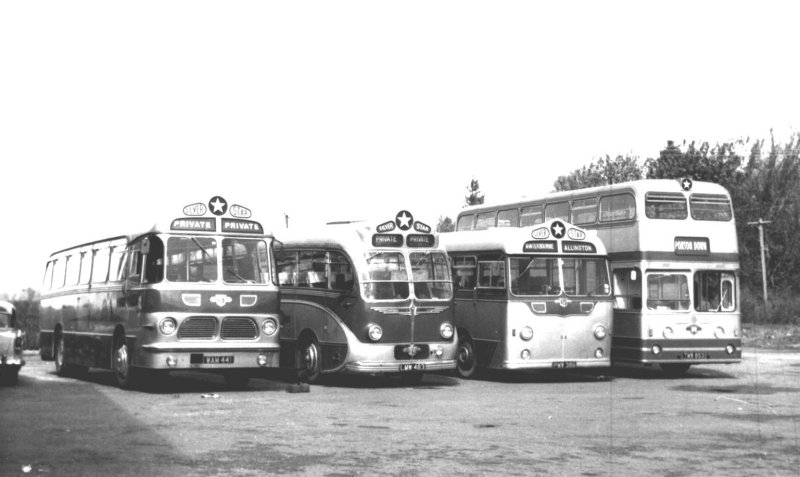 |
||||||||||||||||||||||||
| Over the years Silver Star tended to favour poster-sized timetables. Below are two examples from 1946 (blue print) and 1953 (black print). | ||||||||||||||||||||||||
|
|
||||||||||||||||||||||||
The
route to Salisbury from the 1946 timetable - coming down along Winterslow Road
from Porton Camp the Silver
Star buses
passed through a brick lined tunnel under the railway and then turned
right
(away from the Salisbury direction) at Chapman's Corner in the village
of Porton, proceeding past Idmiston Houses and Idmiston Church along
narrow roads to
Idmiston Turning ('Hairpin Bend' in the fare chart above, which was a
very tight left hand turn onto the A338 towards Salisbury) and was also the point where the buses
from Allington via Boscombe joined the route. Then past
Targett's Corner on the hillside above Porton village, followed by a left
turn to then bear right at Policeman's Corner in Winterbourne Gunner
(where the road towards East Gomeldon branched off), down through
Winterbourne Dauntsey to Winterbourne Church in Winterbourne Earls.
Following the A338 southwards past Hurdcott, left over the railway, then right. In a mile or two reaching St Thomas Bridge,
turning right onto the A30 to go under the rail bridge, up past
the cemetery and Glenmore Road (bridging over the rail line one last time)
to St Marks
Church and down Bedwin Street into the centre of Salisbury and the market square.
In the timetable below note that the departures from Salisbury at 12 noon and 4 pm were each operated by two buses, one for Allington and one for Porton. Several departures now omit Idmiston village, coming down from Porton Camp to Chapman's Corner and proceeding direct to Targett's Corner and turning left. This 1952 timetable was still being issued to passengers three years later in 1955. The ex-Lee service to East Gomeldon is included as a separate table. Selway's Halt is included as a timing point between Porton Camp and Chapman's Corner. This still exists as a named bus stop today, but could the origin of the name in some way relate to Harry Selway who was the long standing Porton village carrier until the 1960s? |
||||||||||||||||||||||||
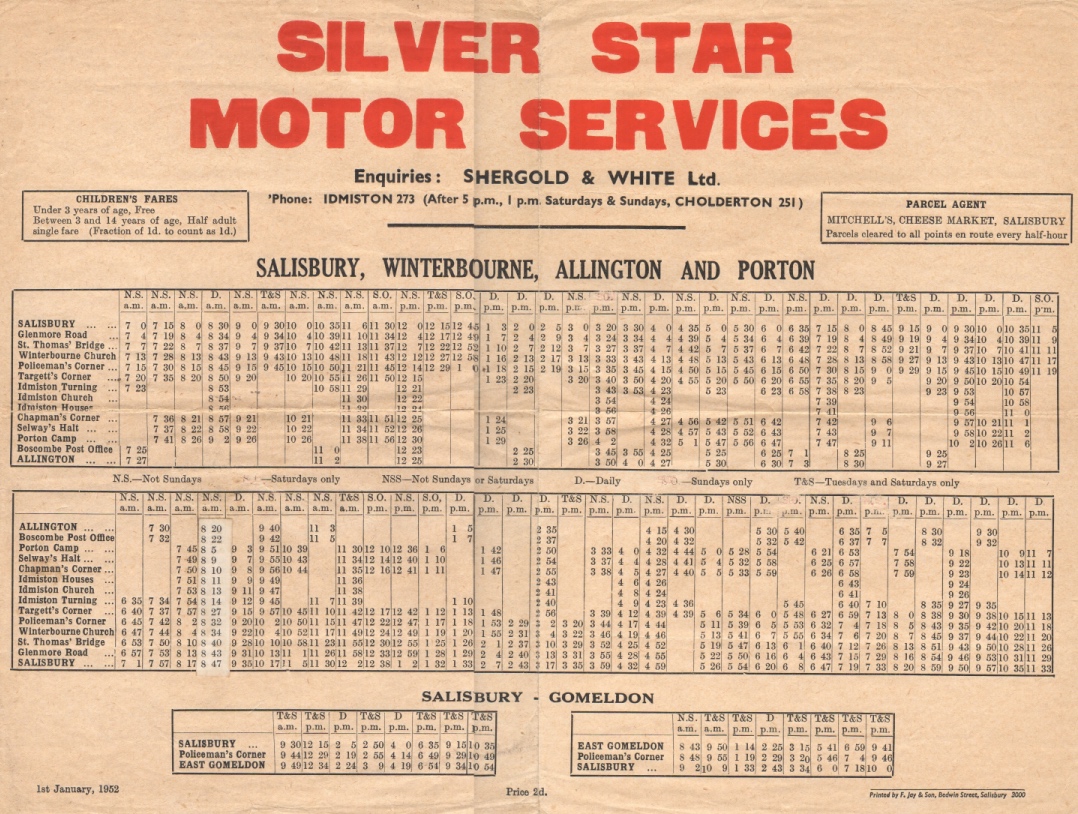 |
||||||||||||||||||||||||
|
As well as the daily bus route in the
timetables above there was also a
dedicated workers service. It was introduced in 1957 to link two of the
then new housing developments around the city of Salisbury at Bemerton
Heath and Pauls Dene to the
defence establishments at Porton Camp (now the premises of Public
Heatlth England). The timetable illustrated below is from 1958.
|
||||||||||||||||||||||||
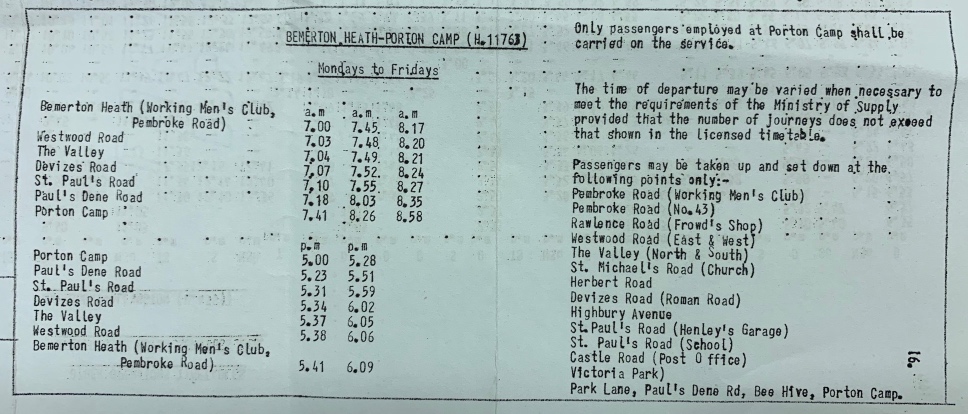
|
||||||||||||||||||||||||
|
||||||||||||||||||||||||
|
||||||||||||||||||||||||
|
||||||||||||||||||||||||



